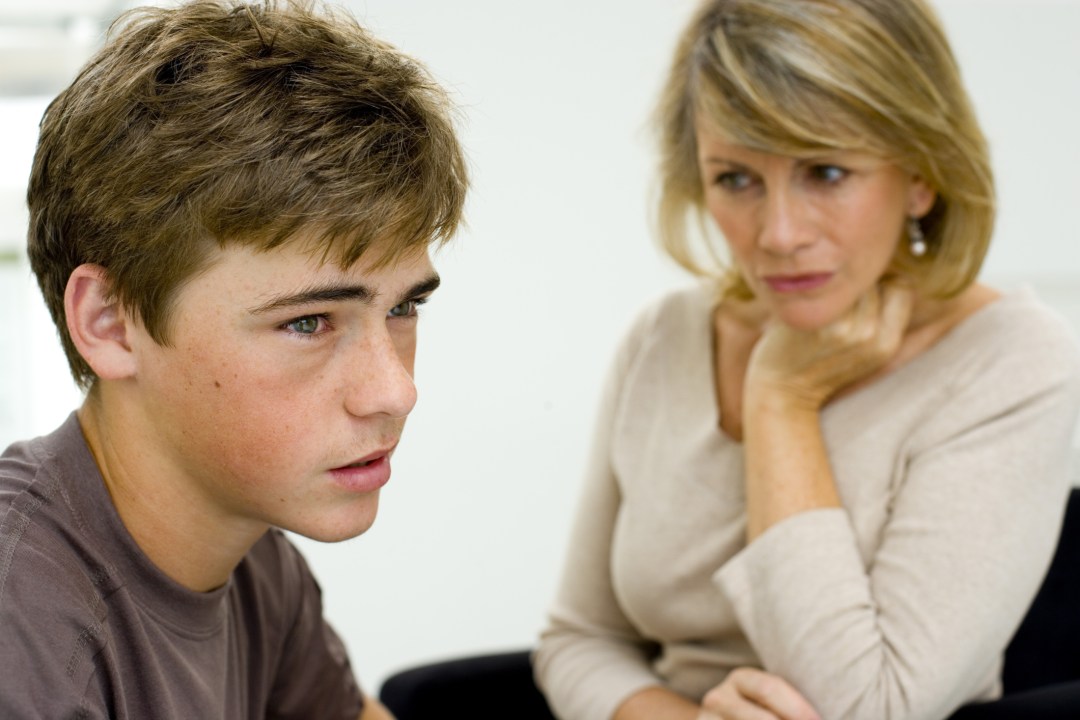How do you deal with your partner’s children when they’re badly-behaved?
How do you handle bad-tempered or badly behaved children when they’re not your own, asks our family expert Ilona Boniwell, mother to two step-children, her own two teenage sons and a toddler

Jason’s facial expression is like a slapped arse. All my attempts at interacting with my lovely son are met with a gruff ‘leave me alone’ – that’s if I get any response at all. What’s up, I ask? Is it his girlfriend? His mates? Has the school got to him again, or did he stay up until 2am and is simply knackered? Deep down I doubt it’s anything serious – Jason occasionally lapses into unfriendly, unresponsive moods, and will metamorphose into his usual cheerful self once he’s ready. However, in the meantime, he’s not really the best company.
As the Sunday family lunch draws closer, the atmosphere is tense. My husband doesn’t appreciate teenage moods. He believes everyone should strive to contribute to a convivial family ambiance even if they’re feeling lousy. I don’t disagree – the implicit rules of community living demand that we try not to impose our emotions on others. Our respective younger adolescents are much better at that than our older ones. Unfortunately, I know too well how disagreeable Jason gets upon hearing advice on pulling himself together. I also know it’s difficult for my husband to accept a disrespectful teenager.
As lunch is about to start, I notice that Hugo, my husband’s eldest, seems impatient. It transpires he has planned to take a half-day trip to a skate park with friends to practise BMX jumps, so understandably he can’t wait to get lunch over and done with. I ask if he has finished his homework. He responds positively, but doesn’t sound convincing. Less innocently, I ask him to show me what he has done. Matching the list of tasks for the weekend with work strangely located somewhere in the middle of his notebook doesn’t do the trick, so the verdict is clear – no going out until it’s done. He yells and throws a fit (understandable, now he will miss the train his friends are taking), but the rules are the rules.
So, a ‘perfect’ family lunch. One teenager in a passive-aggressive mood, another in a rage. Lovely! I will spare you the description of the rest…
Blood is thicker than water
I’m proud to say that as a couple and as a family, we’ve gone a long way to establish clear rules and boundaries, and both my husband and I try to respect them as much as we can, striving to give out consistent signals of outward behaviour. I just wish it was that easy when it comes to emotions boiling on the inside.
The dire truth is that even when both our eldest teens are tricky to handle, my husband and I become more upset with the step-children, and more sympathetic towards our own. While I know Jason was spreading negative emotions, making no effort to respect the family lunch atmosphere, with my mother’s hat on, I feel sorry for him. Easy excuses rush to mind – he had a difficult week, he’s tired, he’s just a teenager after all. Hugo, on the other hand, committed a deliberate deception. He knew his homework should have been finished by Sunday, and there’s never any going out until then, but he chose to ignore it and lie instead. Does it not just show how immoral he is, I rage inwardly?
Let’s change hats. I’m now my husband, and Hugo is my own flesh and blood, while Jason is a (mostly lovely) very tall young man with occasionally bad manners. I feel annoyed with Hugo, but I understand him completely – he’s only 16, he loves the BMX and he hates maths. On a sunny afternoon, how can I not feel sorry for my son whose only crime is wishing to have fun with his friends? Jason, on the other hand, I struggle to understand – he’s almost an adult, an example to his four younger siblings, yet he chooses to behave like an arrogant so-and-so.
Third hat on, this time the psychologist’s. Research shows that in a negative mood, we’re much more susceptible to bias – gender, racial, or ‘in-group/out-group’. In-group/out-group is a social identity theory – where social identity gives a person a sense of who they are based on their group membership.
In order to increase our self-image, we enhance the status of the group we belong to. For example, you might say, yours is the best country in the world. And you might increase your self-image by discriminating and holding prejudiced views against the out-group, which you don’t belong to. For example, the French are such a bunch of losers. And it can work in families, too: my son is good, your son is bad.
What can we do? What helps? Certainly, the proximity, because the out-group can come into the circle of the in-group. Certainly honesty, empathy and communicating – being honest with your partner about how you feel, while stepping into their shoes and understanding their perspective (with all the baggage of pain and guilt you both may have). And of course, the positivity, recognising each other’s strengths and sharing good times together. Research demonstrates that when we experience positive emotions, biases diminish or disappear altogether. And let’s not forget about love – new studies show love is much less of an accident waiting (or not) to happen, and is much more of a choice and ongoing work.
More inspiration
Read: Love 2.0 by Barbara Fredrickson (Plume, £9.66)
Visit: Positive Emotions and Psychophysiology Lab
Buy: Strengths Cards from positran.fr
Dr Ilona Boniwell is our family expert and one of the most respected positive psychologists in the world. She lives with her husband, their toddler and four teenagers. Got a question for Ilona? Email ilona@psychologies.co.uk, with ‘ILONA’ in the subject line









